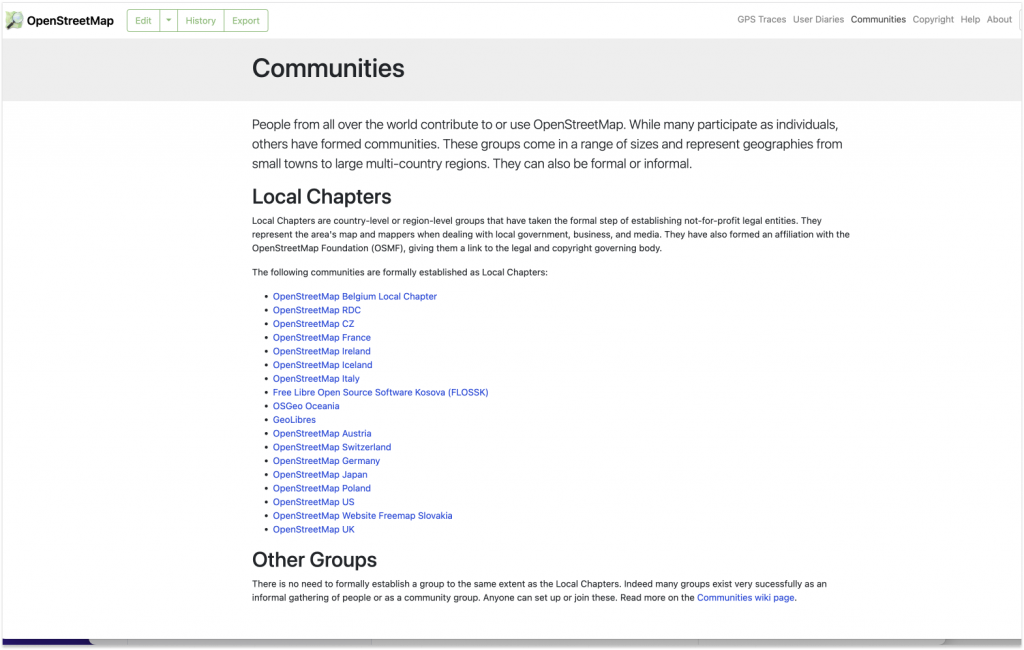There’s a new way to find and connect with OSM communities.
In the upper right corner of OSM.org, you can now see a “Communities” tab that links to a single, centralized location that lists formal Local Chapters, as well as the other OSM communities. Given how many communities there are and how fast OSM is growing, it’s a good time to add a prominent way to connect.

According to LCCWG member Joost Schouppe, the new tab “is probably the most visible change on osm.org since the addition of Notes.”
Once you have navigated to the new “Communities” page, you’ll see that the data for the Local Chapters listings is dynamically delivered via the OSM Community Index (OCI). In fact, the most difficult aspect of the project was figuring out how to integrate the OCI data into the page rather than just adding a simple list of Local Chapters as static content. As website maintainer Andy Allan noted, “The latter would have been quick and easy, but using the OCI means it is automatically updated when new Chapters are added, and it also means we are reusing all the translations for the Chapter names from the 46 different languages that we already support.”

While there is not currently a way to dynamically capture all of the other, less formalized communities, the addition of the “Other Groups” section highlights their existence and points the way to more information.
“It’s just a start” says LCCWG member Adam Hoyle, who also worked on the project. “Ideally this can grow into an even better centralized page for people and communities to find each other.“
Showing a list of Local Chapters is only scratching the surface of what can be done, now that the various underlying technical challenges have been solved. For example, when new mappers set their home location on their profile, they could be shown a list of local forums, mapping groups, and communication channels customised to their location could immediately be shown on their personal dashboard.
The key to shipping additional improvements to the “Communities” page is having volunteers to help out. ”All this community information is in OCI already, so we now need people to help expand our integration,“ says Allan. Schouppe adds that “this particular issue has been on the LCCWG agenda since October 2020, and Adam started working on it in January 2021. It goes to show that, because we are all volunteers, it takes a lot of time and effort to evolve the osm.org website, but it can be done.”
→ To contribute to the development of OSM.org, please visit the main Github and/or this issue, which highlights the many existing pull requests and gives ideas for how to contribute.
→ To help the LCCWG with their efforts to help local communities grow, please join one of their channels.
I’d like to thank Adam Hoyle for his work and patience while we worked through getting the technical foundations in place, which took a while but sets us up for the future; and also to the team behind OCI who made some changes to their side of things to help us get the translations fully working more easily. –-Andy Allan
The OpenStreetMap Foundation is a not-for-profit organisation, formed to support the OpenStreetMap Project. It is dedicated to encouraging the growth, development and distribution of free geospatial data for anyone to use and share. The OpenStreetMap Foundation owns and maintains the infrastructure of the OpenStreetMap project, is financially supported by membership fees and donations, and organises the annual, international State of the Map conference. Our volunteer Working Groups and small core staff work to support the OpenStreetMap project. Join the OpenStreetMap Foundation for just £15 a year or for free if you are an active OpenStreetMap contributor.
